人教版英语必修4课文讲解
人教版高中英语必修4内容全解
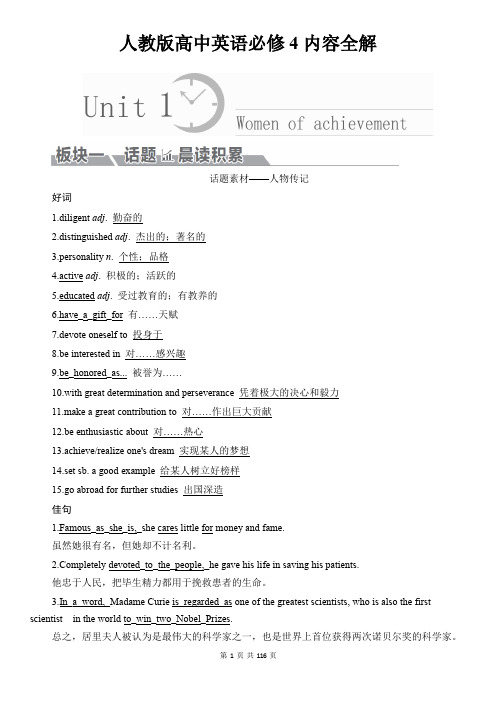
人教版高中英语必修4内容全解话题素材——人物传记好词1.diligent adj. 勤奋的2.distinguished adj. 杰出的;著名的3.personality n. 个性;品格4.active adj. 积极的;活跃的cated adj. 受过教育的;有教养的6.have_a_gift_for 有……天赋7.devote oneself to 投身于8.be interested in 对……感兴趣9.be_honored_as... 被誉为……10.with great determination and perseverance 凭着极大的决心和毅力11.make a great contribution to 对……作出巨大贡献12.be enthusiastic about 对……热心13.achieve/realize one's dream 实现某人的梦想14.set sb. a good example 给某人树立好榜样15.go abroad for further studies 出国深造佳句1.Famous_as_she_is,_she cares little for money and fame.虽然她很有名,但她却不计名利。
pletely devoted_to_the_people,_he gave his life in saving his patients.他忠于人民,把毕生精力都用于挽救患者的生命。
3.In_a_word,_Madame Curie is_regarded_as one of the greatest scientists, who is also the first scientist in the world to_win_two_Nobel_Prizes.总之,居里夫人被认为是最伟大的科学家之一,也是世界上首位获得两次诺贝尔奖的科学家。
(完整word版)人教版高中英语必修4知识点讲解(良心出品必属精品).doc

人教版高中英语必修4 知识点讲解必修 4Unit1 Women of achievement知识点讲解重点词汇1. achieve【课文原句】 She has achieved everything she wanted to do (P3) 【名师点拨】 achieve v.意为“完成;达到”,指经过长期努力而达到某目标、地位或标准等。
其名词形式为achievement ,意为“成就;可指“成就感”。
如:功绩”, a sense of achievementHe had finally achieved success.Even a small success gives you a sense of achievement.2. condition【课文原句】 She helped improve prison conditions and gave prisoners work and education. (P1)【名师点拨】 condition意为“环境;境况;条件”时,是可数名词,常用复数形式 conditions;意为“状态;状况”时,是不可数名词,be in good condition表示“处于良好的状态”,be out of condition 表示“健康状况不佳”。
如:We should pay more attention to the poor living under thebad conditions.The astronauts soon got used to the condition ofweightlessness.My car is old but in good condition.He is overweight and out of condition.【知识拓展】condition 意为“条件”时,常用短语on condition that ,表示“如果;在条件下”;在美国英语中,也经常用under the condition that。
人教版高一英语必修4课文原文
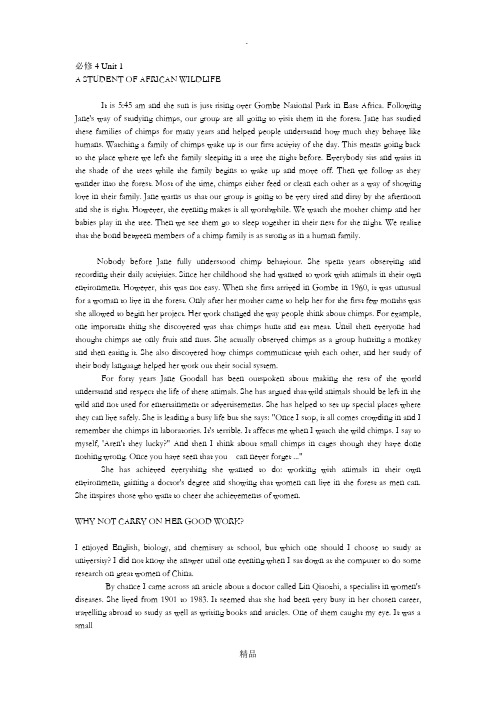
必修4 Unit 1A STUDENT OF AFRICAN WILDLIFEIt is 5:45 am and the sun is just rising over Gombe National Park in East Africa. Following Jane's way of studying chimps, our group are all going to visit them in the forest. Jane has studied these families of chimps for many years and helped people understand how much they behave like humans. Watching a family of chimps wake up is our first activity of the day. This means going back to the place where we left the family sleeping in a tree the night before. Everybody sits and waits in the shade of the trees while the family begins to wake up and move off. Then we follow as they wander into the forest. Most of the time, chimps either feed or clean each other as a way of showing love in their family. Jane warns us that our group is going to be very tired and dirty by the afternoon and she is right. However, the evening makes it all worthwhile. We watch the mother chimp and her babies play in the tree. Then we see them go to sleep together in their nest for the night. We realize that the bond between members of a chimp family is as strong as in a human family.Nobody before Jane fully understood chimp behaviour. She spent years observing and recording their daily activities. Since her childhood she had wanted to work with animals in their own environment. However, this was not easy. When she first arrived in Gombe in 1960, it was unusual for a woman to live in the forest. Only after her mother came to help her for the first few months was she allowed to begin her project. Her work changed the way people think about chimps. For example, one important thing she discovered was that chimps hunt and eat meat. Until then everyone had thought chimps ate only fruit and nuts. She actually observed chimps as a group hunting a monkey and then eating it. She also discovered how chimps communicate with each other, and her study of their body language helped her work out their social system.For forty years Jane Goodall has been outspoken about making the rest of the world understand and respect the life of these animals. She has argued that wild animals should be left in the wild and not used for entertainment or advertisements. She has helped to set up special places where they can live safely. She is leading a busy life but she says: "Once I stop, it all comes crowding in and I remember the chimps in laboratories. It's terrible. It affects me when I watch the wild chimps. I say to myself, 'Aren't they lucky?" And then I think about small chimps in cages though they have done nothing wrong. Once you have seen that you can never forget ..."She has achieved everything she wanted to do: working with animals in their own environment, gaining a doctor's degree and showing that women can live in the forest as men can. She inspires those who want to cheer the achievements of women.WHY NOT CARRY ON HER GOOD WORK?I enjoyed English, biology, and chemistry at school, but which one should I choose to study at university? I did not know the answer until one evening when I sat down at the computer to do some research on great women of China.By chance I came across an article about a doctor called Lin Qiaozhi, a specialist in women's diseases. She lived from 1901 to 1983. It seemed that she had been very busy in her chosen career, travelling abroad to study as well as writing books and articles. One of them caught my eye. It was a smallbook explaining how to cut the death rate from having and caring for babies. She gave some simple rules to follow for keeping babies clean, healthy and free from sickness. Why did she write that? Who were the women that Lin Qiaozhi thought needed this advice? I looked carefully at the text and realized that it was intended for women in the countryside. Perhaps if they had an emergency they could not reach a doctor.Suddenly it hit me how difficult it was for a woman to get medical training at that time. That was a generation when girls' education was always placed second to boys'. Was she so much cleverer than anyone else? Further reading made me realize that it was hard work and determination as well as her gentle nature that got her into medical school. What made her succeed later on was the kindness and consideration she showed to all her patients. There was story after story of how Lin Qiaozhi, tired after a day's work, went late at night to deliver a baby for a poor family who could not pay her.By now I could not wait to find out more about her. I discovered that Lin Qiaozhi had devoted her whole life to her patients and had chosen not to have a family of her own. Instead she made sure that about 50,000 babies were safely delivered. By this time I was very excited. Why not study at medical college like Lin Qiaozhi and carry on her good work? It was still not too late for me to improve my studies, prepare for the university entrance examinations, and….必修4 Unit 2A PIONEER FOR ALL PEOPLEAlthough he is one of China's most famous scientists, Yuan Longping considers himself a farmer, for he works the land to do his research. Indeed, his sunburnt face and arms and his slim, strong body are just like those of millions of Chinese farmers, for whom he has struggled for the past five decades. Dr Yuan Longping grows what is called super hybrid rice. In 1974, he became the first agricultural pioneer in the world to grow rice that has a high output. This special strain of rice makes it possible to produce one-third more of the crop in the same fields. Now more than 60% of the rice produced in China each year is from this hybrid strain.Born into a poor farmer's family in 1930, Dr Yuan graduated from Southwest Agricultural College in 1953. Since then, finding ways to grow more rice has been his life goal. As a young man, he saw the great need for increasing the rice output. At that time, hunger was a disturbing problem in many parts of the countryside. Dr Yuan searched for a way to increase rice harvests without expanding the area of the fields. In 1950, Chinese farmers could produce only fifty million tons of rice. In a recent harvest, however, nearly two hundred million tons of rice was produced. These increased harvests mean that 22% of the world's people are fed from just 7% of the farmland in China. Dr Yuan is now circulating his knowledge in India, Vietnam and many other less developed countries to increase their rice harvests. Thanks to his research, the UN has more tools in the battle to rid the world of hunger. Using his hybrid rice, farmers are producing harvests twice as large as before.Dr Yuan is quite satisfied with his life. However, he doesn't care about being famous. He feels it gives him less freedom to do his research. He would much rather keep time for his hobbles. He enjoys listening to violin music, playing mah-jong, swimming and reading. Spending money on himself or leading a comfortable life also means very little to him. Indeed, he believes that a person with too much money has more rather than fewer troubles. He therefore gives millions of yuan to equip others for their research in agriculture.Just dreaming for things, however, costs nothing. Long ago Dr yuan had a dream about rice plants as tall as sorghum. Each ear of rice was as big as an ear of corn and each grain of rice was as huge as a peanut. Dr Yuan awoke from his dream with the hope of producing a kind of rice that could feed more people. Now, many years later, Dr Yuan has another dream: to export his rice so that it can be grown around the globe. One dream is not always enough, especially for a person who loves and cares for his people.CHEMICAL OR ORGANIC FARMING?Over the past half century, using chemical fertilizers has become very common in farming. Many farmers welcomed them as a great way to stop crop disease and increase production. Recently, however, scientists have been finding that long-term use of these fertilizers can cause damage to the land and, even more dangerous, to people's health.What are some of the problems caused by chemical fertilizers? First, they damage the land by killing the helpful bacteria and pests as well as the harmful ones. Chemicals also stay in the ground and underground water for a long time. This affects crops and, therefore, animals and humans, since chemicals get inside the crops and cannot just be washed off. These chemicals in the food supply build up in people's bodies over time. Many of these chemicals can lead to cancer or other illnesses. In addition, fruit, vegetables and other food grown with chemical fertilizers usually grow too fast to be full of much nutrition. They may look beautiful, but inside there is usually more water than vitamins and minerals.With these discoveries, some farmers and many customers are beginning to turn to organic farming. Organic farming is simply farming without using any chemicals. They focus on keeping their soil rich and free of disease. A healthy soil reduces disease and helps crops grow strong and healthy. Organic farmers, therefore, often prefer using natural waste from animals as fertilizer. They feel that this makes the soil in their fields richer in minerals and so more fertile. This also keeps the air, soil, water and crops free from chemicals.Organic farmers also use many other methods to keep the soil fertile. They often change the kind of crop in each field every few years, for example, growing corn or wheat and then the next year peas or soybeans. Crops such as peas or soybeans put important minerals back into the soil, making it ready for crops such as wheat or corn that need rich and fertile soil. Organic farmers also plant crops to use different levels of soil, for example, planting peanuts that use the ground's surface followed by vegetables that put down deep roots. Some organic farmers prefer planting grass between crops to prevent wind or water from carrying away the soil, and then leaving it in the ground to become a natural fertilizer for the next year's crop. These many different organic farming methods have the same goal: to grow good food and avoid damaging the environment or people's health.必修4 Unit 3A MASTER OF NONVERBAL HUMOURAs Victor Hugo once said, "Laughter is the sun that drives winter from the human face", and up to now nobody has been able to do this better than Charlie Chaplin. He brightened the lives of Americans and British through two world wars and the hard years in between. He made people laughat a time when they felt depressed, so they could feel more content with their lives.Not that Charlie's own life was easy! He was born in a poor family in 1889. His parents were both poor music hall performers. You may find it astonishing that Charlie was taught to sing as soon as he could speak and dance as soon as he could walk. Such training was common in acting families at this time, especially when the family income was often uncertain. Unfortunately his father died, leaving the family even worse off, so Charlie spent his childhood looking after his sick mother and his brother. By his teens, Charlie had, through his humour, become one of the most popular child actors in England. He could mime and act the fool doing ordinary everyday tasks. No one was ever bored watching him -his subtle acting made everything entertaining.As time went by, he began making films. He grew more and more popular as his charming character, the little tramp, became known throughout the world. The tramp, a poor, homeless man with a moustache, wore large trousers, worn-out shoes and a small round black hat. He walked around stilly carrying a walking stick. This character was a social failure but was loved for his optimism and determination to overcome all difficulties. He was the underdog who was kind even when others were unkind to him.How did the little tramp make a sad situation entertaining? Here is an example from one of his most famous films, The Gold Rush. It is the mid-nineteenth century and gold has just been discovered in California. Like so many others, the little tramp and his friend have rushed there in search of gold, but without success. Instead they are hiding in a small hut on the edge of a mountain during a snowstorm with nothing to eat. They are so hungry that they try boiling a pair of leather shoes for their dinner. Charlie first picks out the laces and eats them as if they were spaghetti. Then he cuts off the leather top of the shoe as if it were the finest steak. Finally he tries cutting and chewing the bottom of the shoe. He eats each mouthful with great enjoyment. The acting is so convincing that it makes you believe that it is one of the best meals he has ever tasted!Charlie Chaplin wrote, directed and produced the films he starred in. In 1972 he was given a special Oscar for his outstanding work in films. He lived in England and the USA but spent his last years in Switzerland, where he was buried in 1977. He is loved and remembered as a great actor who could inspire people with great confidence.ENGLISH JOKES1 There are thousands of jokes which use "play on words" to amuse us. One person asks a question which expects a particular reply. Instead, what he gets is another kind of answer which makes the situation funny. Now read some of these customer and waiter jokes. Can you match the joke with the explanation?1 C: What's that fly doing in my soup?W: Swimming, I think!2 C: What's that?W: It's bean soup.C: I don't want to know what it's been. I want to know what it is now.3 C: Waiter, will the pancakes be long?W: No, sir. Round.2 Some jokes are longer and tell a short, funny story. The following is one of those jokes about the famous detective Sherlock Holmes and his friend Doctor Watson. Read it and decide which of these two kinds of jokes you like better. Give your reasons.Sherlock Holmes and Doctor Watson went camping in a mountainous area. They were lying in the open air under the stars. Sherlock Holmes looked up at the stars and whispered, "Watson, when you look at that beautiful sky, what do you think of?" Watson replied, "I think of how short life is and how long the universe has lasted." "No, no, Watson!" Holmes said. "What do you really think of?." Watson tried again. "I think of how small I am and how vast the sky is." "Try again, Watson!" said Holmes. Watson tried a third time. "I think of how cold the universe is and how warm people can be in their beds." Holmes said, "Watson, you fool! You should be thinking that someone has stolen our tent!"必修4 Unit 4COMMUNICATION: NO PROBLEM?Yesterday, another student and I, representing our university's student association, went to the Capital International Airport to meet this year's international students. They were coming to study at Beijing University. We would take them first to their dormitories and then to the student canteen. After half an hour of waiting for their flight to arrive, I saw several young people enter the waiting area looking around curiously. I stood for a minute watching them and then went to greet them.The first person to arrive was Tony Garcia from Colombia, closely followed by Julia Smith from Britain. After I met them and then introduced them to each other, I was very surprised. Tony approached Julia, touched her shoulder and kissed her on the cheek! She stepped back appearing surprised and put up her hands, as if in defence. I guessed that there was probably a major misunderstanding. Then Akira Nagata from Japan came in smiling, together with George Cook from Canada. As they were introduced, George reached his hand out to the Japanese student. Just at that moment, however, Akira bowed so his nose touched George's moving hand. They both apologized - another cultural mistake!Ahmed Aziz, another international student, was from Jordan. When we met yesterday, he moved very close to me as I introduced myself. I moved back a bit, but he came closer to ask a question and then shook my hand. When Darlene Coulon from France came dashing through the door, she recognized Tony Garcia's smiling face. They shook hands and then kissed each other twice on each cheek, since that is the French custom when adults meet people they know. Ahmed Aziz., on the contrary, simply nodded at the girls. Men from Middle Eastern and other Muslim countries will often stand quite close to other men to talk but will usually not touch women.As I get to know more international friends, I learn more about this cultural "body language". Not all cultures greet each other the same way, nor are they comfortable in the same way with touching or distance between people. In the same way that people communicate with spoken language, they also express their feelings using unspoken "language" through physical distance, actions or posture. English people, for example, do not usually stand very close to others or touch strangers as soon as they meet. However, people from places like Spain, Italy or South American countriesapproach others closely and are more likely to touch them. Most people around the world now greet each other by shaking hands, but some cultures use other greetings as well, such as the Japanese, who prefer to bow.These actions are not good or bad, but are simply ways in which cultures have developed. I have seen, however, that cultural customs for body language are very general - not all members of a culture behave in the same way. In general, though, studying international customs can certainly help avoid difficulties in today's world of cultural crossroads!SHOWING OUR FEELINGSBody language is one of the most powerful means of communication, often even more powerful than spoken language. People around the world show all kinds of feelings, wishes and attitudes that they might never speak aloud. It is possible to "read" others around us, even if they do not intend for us to catch their unspoken communication. Of course, body language can be misread, but many gestures and actions are universal.The most universal facial expression is, of course, the smile –its function is to show happiness and put people at ease. It does not always mean that we are truly happy, however. Smiles around the world can be false, hiding other feelings like anger, fear or worry. There are unhappy smiles, such as when someone "loses face" and smiles to hide it. However, the general purpose of smiling is to show good feelings.From the time we are babies, we show unhappiness or anger by frowning. In most places around the world, frowning and turning one's back to someone shows anger. Making a fist and shaking it almost always means that someone is angry and threatening another person.There are many ways around the world to show agreement, but nodding the head up and down is used for agreement, almost worldwide. Most people also understand that shaking the head from side to side means disagreement or refusal.How about showing that I am bored? Looking away from people or yawning will, in most cases, make me appear to be uninterested. However, if I turn toward and look at someone or something, people from almost every culture will think that I am interested. If I roll my eyes and turn my head away, I most likely do not believe what I am hearing or do not like it.Being respectful to people is subjective, based on each culture, but in general it is probably not a good idea to give a hug to a boss or teacher. In almost every culture, it is not usually good to stand too close to someone of a higher rank. Standing at a little distance with open hands will show that I am willing to listen.With so many cultural differences between people, it is great to have some similarities in body language. We can often be wrong about each other, so it is an amazing thing that we understand each other as well as we do!必修4 Unit 5THEME PARKS — FUN AND MORE THAN FUNWhich theme park would you like to visit? There are various kinds of theme parks, with a different park for almost everything: food, culture, science, cartoons, movies or history. Some parks are famous for having the biggest or longest roller coasters, others for showing the famous sights and sounds of a culture. Whichever and whatever you like, there is a theme park for you!The theme park you are probably most familiar with is Disneyland. It can be found in several parts of the world. It will bring you into a magical world and make your dreams come true, whether traveling through space, visiting a pirate ship or meeting your favourite fairy tale or Disney cartoon character. As you wander around the fantasy amusement park, you may see Snow White or Mickey Mouse in a parade or on the street. Of course Disneyland also has many exciting rides, from giant swinging ships to terrifying free-fall drops. With all these attractions, no wonder tourism is increasing wherever there is a Disneyland. If you want to have fun and more than fun, come to Disneyland!Dollywood, in the beautiful Smoky Mountains in the southeasternUSA, is one of the most unique theme parks in the world. Dollywood shows and celebrates America's traditional southeastern culture. Although Dollywood has rides, the park's main attraction is its culture. Famous country music groups perform there all year in indoor and outdoor theatres. People come from all over America to see carpenters and other craftsmen make wood, glass and iron objects in the old-fashioned way. Visit the candy shop to try the same kind of candy that American southerners made 150 years ago, or take a ride on the only steam- engine train still working in the southeast USA. You can even see beautiful bald eagles in the world's largest bald eagle preserve. And for those who like rides, Dollywood has one of the best old wooden roller coasters, Thunderhead. It is world-famous for having the most length in the smallest space. Come to Dollywood to have fun learning all about America's historical southeastern culture!If you want to experience the ancient days and great deeds of English knights and ladies, princes and queens, then England's Camelot Park is the place for you. Every area of the park is modelled after life in the days of King Arthur and the Knights of the Round Table. In one place, you can watch magic shows with Merlin the Wizard. If you want to see fighting with swords or on horseback, then the jousting area is a good place to visit. If you do well there, King Arthur may choose you to fight in the big jousting tournament. Do you like animals? Then visit the farm area, and learn how people in ancient England ran their farms and took care of their animals. To enter a world of fantasy about ancient England, come to Camelot Park!FUTUROSCOP —EXCITEMENT AND LEARNINGLast week I took a journey deep into space, to the end of the solar system, and was pulled into a black hole. Then I took a trip to Brazil and experienced surviving an airplane crash in the jungle. After that, I joined some divers and went to the bottom of the ocean to see strange blind creatures that have never seen sunlight. For a break, I took part in some car racing and then skied down some of the most difficult mountains in the world. I ended my travels by meeting face to face with a dinosaur, the terrible T-Rex, and survived the experience!I did all this in one great day at Futuroscope. Opened in 1987, Futuroscope is one of the largest space-age parks in the world. This science and technology-based theme park in France uses the most advanced technology. Its 3-D cinemas and giant movie screens provide brand new experiences of the earth and beyond. Visitors can get close to parts of the world they have never experienced,going to the bottom of the ocean, flying through the jungle or visiting the edges of the solar system. The amazing, up-to-date information together with many opportunities for hands-on learning makes the world come to life in a completely new way for visitors. Learning centres throughout the park let visitors try their own scientific experiments, as well as learn more about space travel, the undersea world and much mote..I bought tickets for myself and my friends at the park's entrance, but tickets are also available online. Futuroscope is not only for individuals, but is also the perfect mix of fun and learning for class outings. Classes or other large groups that let Futuroscope know their plans in advance can get the group admission rate. For anyone coming from out of town, Futuroscope has many excellent hotels nearby, most of which provide a shuttle service to the park. If driving, Futuroscope is within easy reach of the freeway. Plan your trip well before starting, since Futuroscope has so many shows, activities and great souvenir shops that it is difficult to see them all. Come ready to walk a lot - be sure to wear some comfortable sneakers or other walking shoes!如有侵权请联系告知删除,感谢你们的配合!精品。
高中英语必修4课文讲解

高中英语必修4课文讲解Unit 1 Women of Achievement1. drive…out of…把……赶出……e.g. Joan of Arc helped drive the English out of Franc.2. concern oneself with…全神贯注于……e.g. She concerned herself with welfare projects.3. devote...to…献身于……;把……献给……。
to是介词,后跟名词或动名词。
e.g. She devoted all her life to medical work.4.“太阳升起到…上”可以用overe.g. The sun is just rising over the top of the tree.5. mean doing sth. 意味干某事;mean to do sth.打算,计划干某事e.g. This means going home with nothing.这意味着什么也不带着回家。
He means to go home with nothing. 他打算什么也不带回家。
6. move off离开;启程;出发e.g. The family woke up and moved off.那一家子起床后离开了。
7. worthwhile adj.值得花时间或精力的。
be worthwhile doing sth./to do sth. 值得做某事。
be worth sth./ doing sth. 值得做某事be worthy to be done/of being done………是值得做的e.g. It’s worthwhile to visit/ vi siting the Great Wall.= The Great Wall is worth visiting/a visit.=The Great Wall is worthy to be visited/ of being visited.8. spend…(in) doing sth. 花费……干某事e.g. She spent years observing and recording their daily activities.9. lead a...life 过一个……样的生活。
人教版高中英语高一必修四Unit5课文课件阅读部分

2. What do you know about ancient English stories? What other activities do you imagine there are at Camelot Park?
3. Disneyland is a place to have fun. What will you do if you have a chance to visit Disneyland ?
2. fun: enjoyment; pleasure (U) have fun: enjoy oneself 尽情地玩 for fun: for pleasure 为了娱乐 a lot of / much / no fun 有趣/没趣 (be) in fun 在开玩笑 The little cat is full of fun. It’s no fun spending the weekend doing
D. Theme parks have a certain idea.
2. Which of the following are mentioned in the text? Disneyland, Dollywood, Camelot Park,
Give the main idea of each paragraph:
Window of the World
in Shenzhen
World Water park in Canada is a park where people can take part in all kinds of activities in water.
China Folk Culture Village
made in ancient England . Visitors to Dollywood can taste candy like the candy made in the American South 150 years ago.
人教版高中英语必修4unit1课文知识点详解
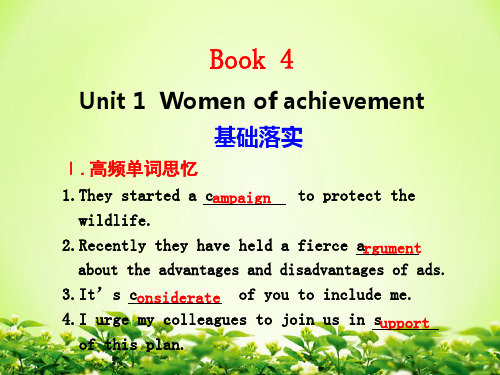
归纳总结 observe _v_t_._看__到__;__观__察__到__;__注__意__到__;__遵__守_。 observe属于感观动词,在主动语态中,作宾补的不 定式 不带to ,但在被动语态中则必须 用to 。 observe+宾语+do/doing sth.看到,察觉到某人做 某事/正在做某事 observe sth.观察(注意到)某事物 observe that...观察到…… observe on/upon sth.关于……陈述意见 observe a child’s behavior观察一个孩子的行为 observe the terms of a contract遵守合同的条款
A library with 100 books was denoted to our school
3.She is leading a busy life but she says: “Once I stop,it all comes crowding in and I remember the chimps in laboratories.”她 的生活是繁忙的,然而,她却说:“我一旦停下 来,所有的一切都会涌上心头,我就会想起实验 室里的黑猩猩。” 考点提炼 once I stop是once引导的_时__间__状__语_ 从句,主句是由_a_n_d连接的两个并列分句,crowding in为现在分词短语作伴随状语,修饰comes。
Book 4
Unit 1 Women of achievement
基础落实
Ⅰ.高频单词思忆
1.They started a campaign to protect the wildlife.
2.Recently they have held a fierce argument about the advantages and disadvantages of ads.
人教版高中英语必修四 Unit1 Reading 林巧稚(共16张PPT)

That meant she won
other women to
people’s__re_s_p_e_c_t_(尊敬). become doctors.
Women of Achievements
“万婴之母” 林巧稚
(1901—1983)
“I am the doctor on duty(值班) whenever and wherever. No matter when and no matter where, saving women and children is always my responsibility.”
Writing
不
铁
畏
索
人
横
间
渡
多
济
疾
苍
苦
生
李佳生 33岁 从医8年 溜索过怒江出诊
Read & write
1. I enjoyed English, biology, and chemistry at school, but which one should I choose to study at university?
Women of Achievements
“万婴之母” 林巧稚
(1901—1983)
“我随时随地都是值班医生, 无论是什么时候,无论在什么 地方,救治危重的孕妇,都是 我的职责。” ——林巧稚
学习目标
• 通过阅读获取细节信息; • 句型仿写及写作; • 学习伟大的女性——林巧稚的高贵品质;
2’
She was a _sp_e_c_i_a_li_s_t (专家)in medical work. She was kind and c_o_n_s_i_d_e_ra_t_e_(体贴周到的)and she safely _d_e_li_v_e_re_d_(接生)many children.
人教版高中英语必修unit4课文知识点详解

of the stars
基础落实
Ⅰ.高频单词思忆
1.The Chinese government did well in preventing SARS from spreading.
2.He cheered up at the good news. 3.There is a friendly atmosphere of helping
6.The fans cheered up at the _p_r_e_s_e_n_c_e_ (到场) of Jay Chou.
7.As a student,I should learn the _f_u_n_d_a_m_e_n_t_a_l (基本的) rules of mathematics.
8.A balloon _f_l_o_a_t_e_d_(飘过) across the sky. 9.There is a shortage of _o_x_y_g_e_n_(氧气) at the
2020/7/25
归纳总结 mass _n_.(_聚__成__一__体__的__)_团__;_块__;_大_多__数__;_质__量__;_群__众__;_大__量_。 a mass of/masses of大量的 the mass media大众传媒 mass production批量生产 in the mass总体上,总的来说 the (great) mass of大多数,大部分 注意 在表示“大量的,许多的”含义时,a mass of/masses of既可修饰可数名词,也可修饰不可数 名词。在英语中类似的短语还包括:plenty of,a lot of,lots of,a quantity of,quantities of等。
Unit 4 Sharing Reading Thinking 课文高中英语人教版选择性必修第四册
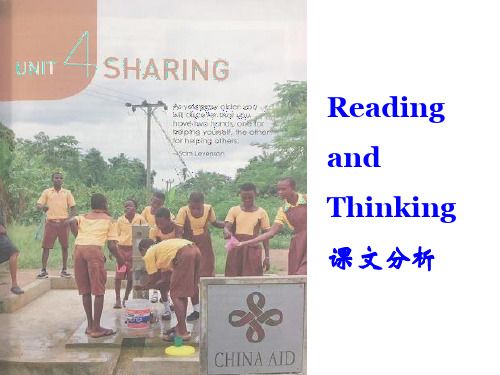
宾语从句。
let alone
需跟与前面相同的平行结 Today, some young
构。用在否定句后,表示 people never even read
由于极可能发生的事情都 没有发生,某种情况就更
a newspaper, let alone
不可能了。
a book.
【语境应用】用let alone或not to mention完成句子。 1) They have three dogs to look after, __n_o_t__to__m_e_n_t_i_o_n_/_
some sweets and jam from home; I’ve
been dying to have some of my
be dying to do sth ቤተ መጻሕፍቲ ባይዱ望做某事
favourite sweets, and it’s always nice to
get mail!
1. I’ve been dying to have some of my favourite sweets, and it’s always nice to get mail!
我一直非常渴望吃一些我最喜欢的糖果,而且 收到邮包总是令人开心不已。
be dying for / to do sth: to be extremely eager to have / do sth 极想得到,渴望得到,渴望做某事
eg I’m dying to hear your news. I’m dying for something to eat.
➢ in chorus all together; in unison
同时;一起
eg There was a chorus of agreement from the committee.
人教版英语必修4课文讲解Unit2课件
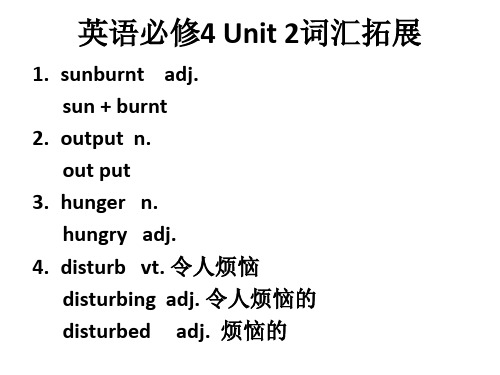
英语必修4 Unit 2课文 讲解
Indeed, he believes that a person with too much money has more rather than fewer troubles. 事实上,他认为一个人有了太多 钱,他的麻烦事只会更多,而不是更少。
He therefore gives millions of yuan to equip others for their research in agriculture. 于是, 他拿出好几百万元帮助其他人进行农业科 学研究。
• 25. lead a comfortable life 过着舒适的生活 • 26.means little 没有什么意义
英语必修4 Unit 2课文 讲解
• Just dreaming for things, however, costs nothing. 梦想是不花本钱的。 Long ago Dr yuan had a dream about rice plants as tall as sorghum. Each ear of rice was as big as an ear of corn and each grain of rice was as huge as a peanut. 很久以前,袁博士曾在梦里看到 水稻长得像高粱一样高,稻穗跟玉米穗一 样大,而每粒稻谷像花生米一样大。
increase rice harvests without expanding the area of the fields. 袁博士要在不增加土地面积 的基础上寻求达到增收稻谷的途径。 In 1950,
Chinese farmers could produce only fifty million tons of rice. 1950年,中国农民只能生产五千万 吨稻谷,
新课标人教版高一英语必修四unit4教案讲课讲稿
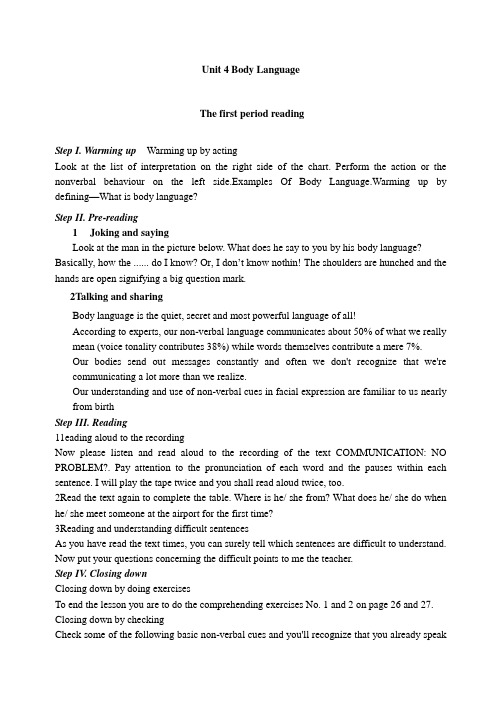
Unit 4 Body LanguageThe first period readingStep I. Warming up Warming up by actingLook at the list of interpretation on the right side of the chart. Perform the action or the nonverbal behaviour on the left side.Examples Of Body Language.Warming up by defining—What is body language?Step II. Pre-reading1Joking and sayingLook at the man in the picture below. What does he say to you by his body language? Basically, how the ...... do I know? Or, I don’t know nothin! The shoulders are hunched and the hands are open signifying a big question mark.2Talking and sharingBody language is the quiet, secret and most powerful language of all!According to experts, our non-verbal language communicates about 50% of what we really mean (voice tonality contributes 38%) while words themselves contribute a mere 7%.Our bodies send out messages constantly and often we don't recognize that we're communicating a lot more than we realize.Our understanding and use of non-verbal cues in facial expression are familiar to us nearly from birthStep III. Reading11eading aloud to the recordingNow please listen and read aloud to the recording of the text COMMUNICATION: NO PROBLEM?. Pay attention to the pronunciation of each word and the pauses within each sentence. I will play the tape twice and you shall read aloud twice, too.2Read the text again to complete the table. Where is he/ she from? What does he/ she do when he/ she meet someone at the airport for the first time?3Reading and understanding difficult sentencesAs you have read the text times, you can surely tell which sentences are difficult to understand. Now put your questions concerning the difficult points to me the teacher.Step IV. Closing downClosing down by doing exercisesTo end the lesson you are to do the comprehending exercises No. 1 and 2 on page 26 and 27. Closing down by checkingCheck some of the following basic non-verbal cues and you'll recognize that you already speakand translate much of the language. “I’m surprised!” I’m shocked!” “I’m sad!”The second period Learning about Language(The ~ing form as the Attribute & Adverbial)Step I. Warming up Warming up by discovering useful words and expressionsTurn to page 27 and do exercises No. 1, 2 ,3 and 4 first. Check your answers.Step II. Learning about grammar1 Reading and thinkingTurn to page 25 and read with me the text of COMMUNICATION: NO PROBLEM? As you read along, pay attention to the uses of The ~ing form as the Attribute & Adverbial.(They are visitors coming from several countries. 作定语;Four people enter looking around in a curious way. 作状语;This is an exciting experience for you. 作定语; You stand watching and listening. 作状语;……)2 Doing exercises No. 1 and 2 on page 29 Turn to page 29. Do exercises No. 1 and 2。
人教版高中英语必修四-第四单元-Body-language-知识点讲解

4. They had a large__m__a_jo_r_i_ty_ (major) over the other party at the last election.
4. 名词作宾语。
5. All our officers are trained
_t_o__d_e_fe_n_d_ (defensive) ourselves against knife attack. 5. 不定式表示目的。
3. __sp_e_a_k____ v.谈话,讲话 _s_p_e_e_c_h___ n. 发言 __sp__o_k_e_n__ adj.口语的
4. _d__ef_e_n_c_e___ n.防御,保卫 _d_e_f_e_n_d____ v. 防御,保卫 _d__ef_e_n_s_iv_e____ adj. 防御的,保卫的
6) A
3.The first person to arrive was Tony Garcia from Colombia, closely followed by Julia Smith from Britain. (Page 26) 第一个到达的是从哥伦比亚来的托尼·加西亚,紧随其 后的是英国的朱莉娅·史密斯。
They will be meeting at a major hotel 2
_w__it_h_ local business people and people 3_w__h_o_ represent the Chinese government. Four people enter looking around 4 _in_ a curious way. You do not want to disappoint your boss,and this is an 5_e_x_c_i_ti_n_g_ (excite) experience for you,So you stand watching and 6_l_is_t_e_n_in_g__ (listen).
高中英语人教版(2019)选择性必修第四册 Unit 2 课文知识点逐段学习 课件PPT

● (1).复习 to do的用法(找出文中 to do做状语,主语等)
● (2).复习while的用法
● a._______________________.
● b._______________________.
● c._______________________.
● (3) vibrate v. 振动
●(1) convince v.使确信,使信服;说服,劝服 ● convinced a.确信的,信服的,坚信不疑的 ● convincing a.令人信服的,有说服力的
●His statement is quite convincing. 他的说辞很有说服力. ●Her excuse was not very convincing .她的借口没什么说服力
That’s all !
●(2)play a part in 扮演…角色,起…作用
●play an important part in…
●play a major part in…
●(3)be contributed by 由…贡献
●
contribute to 有助于...促成...
●
contribution n.贡献,捐款,投稿
29.They have a straightforward and free-and-easy attitude towards life and their friendliness and warmth made me feel at home whenever I went. ●(1)have a straightforward and free-and-easy attitude
towards life ●有一种坦率洒脱的生活态度 ●straightforward a.简单易懂的,诚实坦率的 ●free-and-easy a.无拘无束的,随便的,轻松自在的 ●(2)feel at home 感觉自在/轻松,宾至如归
人教版高中英语必修4课文原文Unit1--5
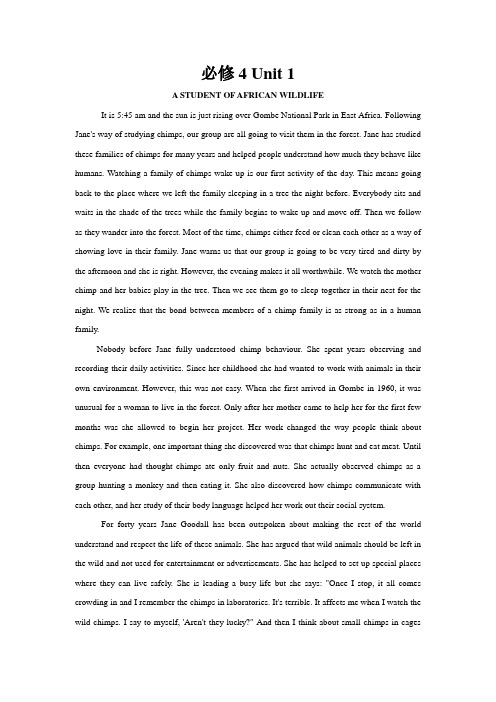
必修4 Unit 1A STUDENT OF AFRICAN WILDLIFEIt is 5:45 am and the sun is just rising over Gombe National Park in East Africa. Following Jane's way of studying chimps, our group are all going to visit them in the forest. Jane has studied these families of chimps for many years and helped people understand how much they behave like humans. Watching a family of chimps wake up is our first activity of the day. This means going back to the place where we left the family sleeping in a tree the night before. Everybody sits and waits in the shade of the trees while the family begins to wake up and move off. Then we follow as they wander into the forest. Most of the time, chimps either feed or clean each other as a way of showing love in their family. Jane warns us that our group is going to be very tired and dirty by the afternoon and she is right. However, the evening makes it all worthwhile. We watch the mother chimp and her babies play in the tree. Then we see them go to sleep together in their nest for the night. We realize that the bond between members of a chimp family is as strong as in a human family.Nobody before Jane fully understood chimp behaviour. She spent years observing and recording their daily activities. Since her childhood she had wanted to work with animals in their own environment. However, this was not easy. When she first arrived in Gombe in 1960, it was unusual for a woman to live in the forest. Only after her mother came to help her for the first few months was she allowed to begin her project. Her work changed the way people think about chimps. For example, one important thing she discovered was that chimps hunt and eat meat. Until then everyone had thought chimps ate only fruit and nuts. She actually observed chimps as a group hunting a monkey and then eating it. She also discovered how chimps communicate with each other, and her study of their body language helped her work out their social system.For forty years Jane Goodall has been outspoken about making the rest of the world understand and respect the life of these animals. She has argued that wild animals should be left in the wild and not used for entertainment or advertisements. She has helped to set up special places where they can live safely. She is leading a busy life but she says: "Once I stop, it all comes crowding in and I remember the chimps in laboratories. It's terrible. It affects me when I watch the wild chimps. I say to myself, 'Aren't they lucky?" And then I think about small chimps in cagesthough they have done nothing wrong. Once you have seen that you can never forget ..."She has achieved everything she wanted to do: working with animals in their own environment, gaining a doctor's degree and showing that women can live in the forest as men can. She inspires those who want to cheer the achievements of women.WHY NOT CARRY ON HER GOOD WORK?I enjoyed English, biology, and chemistry at school, but which one should I choose to study at university? I did not know the answer until one evening when I sat down at the computer to do some research on great women of China.By chance I came across an article about a doctor called Lin Qiaozhi, a specialist in women's diseases. She lived from 1901 to 1983. It seemed that she had been very busy in her chosen career, travelling abroad to study as well as writing books and articles. One of them caught my eye. It was a smallbook explaining how to cut the death rate from having and caring for babies. She gave some simple rules to follow for keeping babies clean, healthy and free from sickness. Why did she write that? Who were the women that Lin Qiaozhi thought needed this advice? I looked carefully at the text andrealized that it was intended for women in the countryside. Perhaps if they had an emergency they could not reach a doctor.Suddenly it hit me how difficult it was for a woman to get medical training at that time. That was a generation when girls' education was always placed second to boys'. Was she so much cleverer than anyone else? Further reading made me realize that it was hard work and determination as well as her gentle nature that got her into medical school. What made her succeed later on was the kindness and consideration she showed to all her patients. There was story after story of how Lin Qiaozhi, tired after a day's work, went late at night to deliver a baby for a poor family who could not pay her.By now I could not wait to find out more about her. I discovered that Lin Qiaozhi had devoted her whole life to her patients and had chosen not to have a family of her own. Instead she made sure that about 50,000 babies were safely delivered. By this time I was very excited. Why not study at medical college like Lin Qiaozhi and carry on her good work? It was still not too late for me to improve my studies, prepare for the university entrance examinations, and….必修4 Unit 2A PIONEER FOR ALL PEOPLEAlthough he is one of China's most famous scientists, Yuan Longping considers himself a farmer, for he works the land to do his research. Indeed, his sunburnt face and arms and his slim, strong body are just like those of millions of Chinese farmers, for whom he has struggled for the past five decades. Dr Yuan Longping grows what is called super hybrid rice. In 1974, he became the first agricultural pioneer in the world to grow rice that has a high output. This special strain of rice makes it possible to produce one-third more of the crop in the same fields. Now more than 60% of the rice produced in China each year is from this hybrid strain.Born into a poor farmer's family in 1930, Dr Yuan graduated from Southwest Agricultural College in 1953. Since then, finding ways to grow more rice has been his life goal. As a young man, he saw the great need for increasing the rice output. At that time, hunger was a disturbing problem in many parts of the countryside. Dr Y uan searched for a way to increase rice harvests without expanding the area of the fields. In 1950, Chinese farmers could produce only fifty million tons of rice. In a recent harvest, however, nearly two hundred million tons of rice was produced. These increased harvests mean that 22% of the world's people are fed from just 7% of the farmland in China. Dr Yuan is now circulating his knowledge in India, Vietnam and many other less developed countries to increase their rice harvests. Thanks to his research, the UN has more tools in the battle to rid the world of hunger. Using his hybrid rice, farmers are producing harvests twice as large as before.Dr Yuan is quite satisfied with his life. However, he doesn't care about being famous. He feels it gives him less freedom to do his research. He would much rather keep time for his hobbles. He enjoys listening to violin music, playing mah-jong, swimming and reading. Spending money on himself or leading a comfortable life also means very little to him. Indeed, he believes that a person with too much money has more rather than fewer troubles. He therefore gives millions of yuan to equip others for their research in agriculture.Just dreaming for things, however, costs nothing. Long ago Dr yuan had a dream about rice plants as tall as sorghum. Each ear of rice was as big as an ear of corn and each grain of rice was as huge as a peanut. Dr Yuan awoke from his dream with the hope of producing a kind of ricethat could feed more people. Now, many years later, Dr Yuan has another dream: to export his rice so that it can be grown around the globe. One dream is not always enough, especially for a person who loves and cares for his people.CHEMICAL OR ORGANIC FARMING?Over the past half century, using chemical fertilizers has become very common in farming. Many farmers welcomed them as a great way to stop crop disease and increase production. Recently, however, scientists have been finding that long-term use of these fertilizers can cause damage to the land and, even more dangerous, to people's health.What are some of the problems caused by chemical fertilizers? First, they damage the land by killing the helpful bacteria and pests as well as the harmful ones. Chemicals also stay in the ground and underground water for a long time. This affects crops and, therefore, animals and humans, since chemicals get inside the crops and cannot just be washed off. These chemicals in the food supply build up in people's bodies over time. Many of these chemicals can lead to cancer or other illnesses. In addition, fruit, vegetables and other food grown with chemical fertilizers usually grow too fast to be full of much nutrition. They may look beautiful, but inside there is usually more water than vitamins and minerals.With these discoveries, some farmers and many customers are beginning to turn to organic farming. Organic farming is simply farming without using any chemicals. They focus on keeping their soil rich and free of disease. A healthy soil reduces disease and helps crops grow strong and healthy. Organic farmers, therefore, often prefer using natural waste from animals as fertilizer. They feel that this makes the soil in their fields richer in minerals and so more fertile. This also keeps the air, soil, water and crops free from chemicals.Organic farmers also use many other methods to keep the soil fertile. They often change the kind of crop in each field every few years, for example, growing corn or wheat and then the next year peas or soybeans. Crops such as peas or soybeans put important minerals back into the soil, making it ready for crops such as wheat or corn that need rich and fertile soil. Organic farmers also plant crops to use different levels of soil, for example, planting peanuts that use the ground's surface followed by vegetables that put down deep roots. Some organic farmers prefer planting grass between crops to prevent wind or water from carrying away the soil, and thenleaving it in the ground to become a natural fertilizer for the next year's crop. These many different organic farming methods have the same goal: to grow good food and avoid damaging the environment or people's health.必修4 Unit 3A MASTER OF NONVERBAL HUMOURAs Victor Hugo once said, "Laughter is the sun that drives winter from the human face", and up to now nobody has been able to do this better than Charlie Chaplin. He brightened the lives of Americans and British through two world wars and the hard years in between. He made people laugh at a time when they felt depressed, so they could feel more content with their lives.Not that Charlie's own life was easy! He was born in a poor family in 1889. His parents were both poor music hall performers. You may find it astonishing that Charlie was taught to sing as soon as he could speak and dance as soon as he could walk. Such training was common in acting families at this time, especially when the family income was often uncertain. Unfortunately his father died, leaving the family even worse off, so Charlie spent his childhood looking after his sick mother and his brother. By his teens, Charlie had, through his humour, become one of the most popular child actors in England. He could mime and act the fool doing ordinary everyday tasks. No one was ever bored watching him -his subtle acting made everything entertaining.As time went by, he began making films. He grew more and more popular as his charming character, the little tramp, became known throughout the world. The tramp, a poor, homeless man with a moustache, wore large trousers, worn-out shoes and a small round black hat. He walked around stilly carrying a walking stick. This character was a social failure but was loved for his optimism and determination to overcome all difficulties. He was the underdog who was kind even when others were unkind to him.How did the little tramp make a sad situation entertaining? Here is an example from one of his most famous films, The Gold Rush. It is the mid-nineteenth century and gold has just been discovered in California. Like so many others, the little tramp and his friend have rushed there in search of gold, but without success. Instead they are hiding in a small hut on the edge of a mountain during a snowstorm with nothing to eat. They are so hungry that they try boiling a pair of leather shoes for their dinner. Charlie first picks out the laces and eats them as if they werespaghetti. Then he cuts off the leather top of the shoe as if it were the finest steak. Finally he tries cutting and chewing the bottom of the shoe. He eats each mouthful with great enjoyment. The acting is so convincing that it makes you believe that it is one of the best meals he has ever tasted!Charlie Chaplin wrote, directed and produced the films he starred in. In 1972 he was given a special Oscar for his outstanding work in films. He lived in England and the USA but spent his last years in Switzerland, where he was buried in 1977. He is loved and remembered as a great actor who could inspire people with great confidence.ENGLISH JOKES1 There are thousands of jokes which use "play on words" to amuse us. One person asks a question which expects a particular reply. Instead, what he gets is another kind of answer which makes the situation funny. Now read some of these customer and waiter jokes. Can you match the joke with the explanation?1 C: What's that fly doing in my soup?W: Swimming, I think!2 C: What's that?W: It's bean soup.C: I don't want to know what it's been. I want to know what it is now.3 C: Waiter, will the pancakes be long?W: No, sir. Round.2 Some jokes are longer and tell a short, funny story. The following is one of those jokes about the famous detective Sherlock Holmes and his friend Doctor Watson. Read it and decide which of these two kinds of jokes you like better. Give your reasons.Sherlock Holmes and Doctor Watson went camping in a mountainous area. They were lying in the open air under the stars. Sherlock Holmes looked up at the stars and whispered, "Watson, when you look at that beautiful sky, what do you think of?" Watson replied, "I think of how short life is and how long the universe has lasted." "No, no, Watson!" Holmes said. "What do you really think of?." Watson tried again. "I think of how small I am and how vast the sky is." "Try again, Watson!" said Holmes. Watson tried a third time. "I think of how cold the universe is and how warm people can be in their beds." Holmes said, "Watson, you fool! You should be thinking that someone has stolen our tent!"必修4 Unit 4COMMUNICATION: NO PROBLEM?Yesterday, another student and I, representing our university's student association, went to the Capital International Airport to meet this year's international students. They were coming to study at Beijing University. We would take them first to their dormitories and then to the student canteen. After half an hour of waiting for their flight to arrive, I saw several young people enter the waiting area looking around curiously. I stood for a minute watching them and then went to greet them.The first person to arrive was Tony Garcia from Colombia, closely followed by Julia Smith from Britain. After I met them and then introduced them to each other, I was very surprised. Tony approached Julia, touched her shoulder and kissed her on the cheek! She stepped back appearing surprised and put up her hands, as if in defence. I guessed that there was probably a major misunderstanding. Then Akira Nagata from Japan came in smiling, together with George Cook from Canada. As they were introduced, George reached his hand out to the Japanese student. Just at that moment, however, Akira bowed so his nose touched George's moving hand. They both apologized - another cultural mistake!Ahmed Aziz, another international student, was from Jordan. When we met yesterday, he moved very close to me as I introduced myself. I moved back a bit, but he came closer to ask a question and then shook my hand. When Darlene Coulon from France came dashing through the door, she recognized Tony Garcia's smiling face. They shook hands and then kissed each other twice on each cheek, since that is the French custom when adults meet people they know. Ahmed Aziz., on the contrary, simply nodded at the girls. Men from Middle Eastern and other Muslim countries will often stand quite close to other men to talk but will usually not touch women.As I get to know more international friends, I learn more about this cultural "body language". Not all cultures greet each other the same way, nor are they comfortable in the same way with touching or distance between people. In the same way that people communicate with spoken language, they also express their feelings using unspoken "language" through physical distance, actions or posture. English people, for example, do not usually stand very close to others or touch strangers as soon as they meet. However, people from places like Spain, Italy or South。
高中英语必修4unit4课文知识点讲解(课堂PPT)
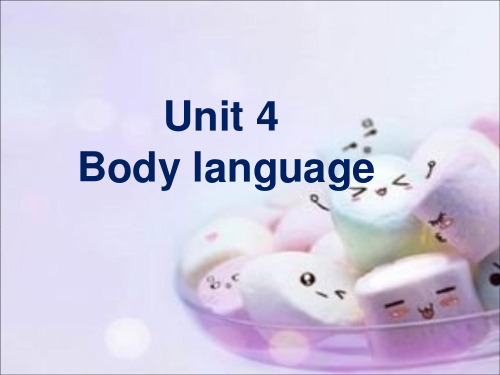
归纳总结 agreement __n_.协__议__;_一__致__;__同_意___。 1.Sign an agreement签定协议 1.break an agreement违反协议 3.reach/make an agreement达成协议 4.under an agreement根据协议 5.in agreement (with)(意见等)一致
即学即用 (1)对你周围的世界感到新奇是件好事。
It is good to _b_e__c_u_r_i_o_u_s__a_b_o_u_t_ the world around you. (2)我很想知道孩子们在做什么。
I’m _c_u_r_i_o_u_s__t_o__k_n_o_w_ what the children are
negotiations.
重点短语与句型
6.at ease
The most universal facial expression is,of course, the smile—its function is to show happiness and
at ease put people _______.(P30) 观察思考 1.He is at ease about the matter. 2.When you feel nervous,you’d better listen
—What does the E stand for?
——E代表什么? 即学即用 (1)她把自己描绘成世界上最好的母亲。
She Represents herself as the kindest
mother in the world.
(2)那个国家的外交部长代表该国出席了会议。
The country __w_a_s__r_e_p_r_e_s_e_n_t_e_d__a_t__t_h_e__c_o_n_f_e_r_e_n_ce
人教版高中英语必修4内容全解
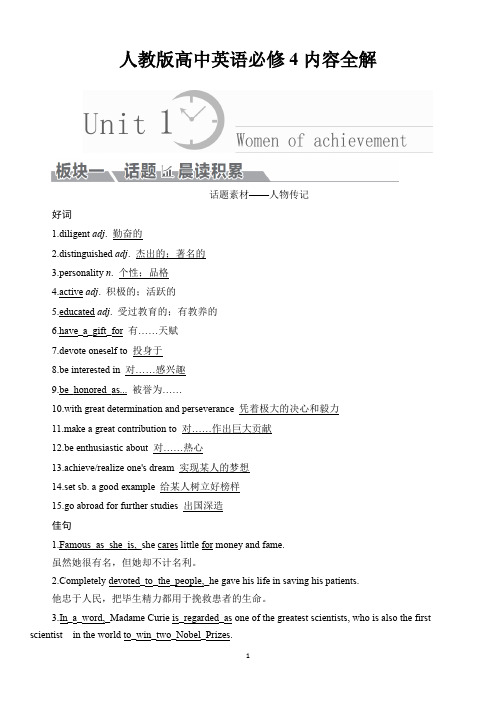
人教版高中英语必修4内容全解话题素材——人物传记好词1.diligent adj. 勤奋的2.distinguished adj. 杰出的;著名的3.personality n. 个性;品格4.active adj. 积极的;活跃的cated adj. 受过教育的;有教养的6.have_a_gift_for有……天赋7.devote oneself to 投身于8.be interested in 对……感兴趣9.be_honored_as...被誉为……10.with great determination and perseverance 凭着极大的决心和毅力11.make a great contribution to 对……作出巨大贡献12.be enthusiastic about 对……热心13.achieve/realize one's dream 实现某人的梦想14.set sb. a good example 给某人树立好榜样15.go abroad for further studies 出国深造佳句1.Famous_as_she_is,_she cares little for money and fame.虽然她很有名,但她却不计名利。
pletely devoted_to_the_people,_he gave his life in saving his patients.他忠于人民,把毕生精力都用于挽救患者的生命。
3.In_a_word,_Madame Curie is_regarded_as one of the greatest scientists, who is also the first scientist in the world to_win_two_Nobel_Prizes.总之,居里夫人被认为是最伟大的科学家之一,也是世界上首位获得两次诺贝尔奖的科学家。
人教版高中英语必修四

《人教版高中英语必修四》学习指南一、课程概述人教版高中英语必修四作为高中英语课程的重要组成部分,旨在帮助学生巩固和提升英语基础,拓宽国际视野,培养跨文化交际能力。
本册教材共有五个单元,每个单元围绕一个主题展开,涉及文化、科技、自然、社会等多个领域。
二、单元内容概览Unit 1 Women of achievement本单元以“女性成就”为主题,通过介绍几位杰出女性的事迹,激发学生树立远大理想,勇于追求自己的价值。
学生将学习如何用英语描述人物品质、成就及其对社会的影响。
Unit 2 Working the land本单元聚焦农业领域,探讨土地与人类生活、发展的紧密联系。
学生将通过学习,了解农业的重要性,以及如何用英语表达与农业相关的话题。
Unit 3 A taste of English humour本单元带领学生领略英语幽默的魅力,学习如何欣赏和理解英语幽默,提高跨文化交际能力。
Unit 4 Body language本单元围绕肢体语言展开,让学生了解不同文化背景下的肢体语言差异,学会运用肢体语言进行有效沟通。
Unit 5 Theme parks本单元探讨主题公园这一休闲娱乐形式,引导学生用英语讨论与旅游、娱乐相关的话题,提高实际运用能力。
三、学习方法建议1. 注重词汇积累:高中英语学习过程中,词汇量是基础。
建议学生充分利用课本、课外读物等资源,积累常用词汇和短语。
3. 重视语法学习:掌握英语语法规则,有助于提高阅读、写作和翻译能力。
建议学生结合课本内容,系统学习语法知识。
4. 拓展阅读视野:阅读是提高英语水平的重要途径。
学生应广泛阅读各类英文资料,增加知识储备,提高阅读理解能力。
5. 培养写作能力:写作是英语学习的核心技能之一。
学生应多进行写作练习,可以尝试写日记、书信、短文等,不断提高写作水平。
四、学习资源推荐1. 教材配套光盘:教材配套的光盘包含了课文朗读、听力练习等,是学习发音和听力技巧的好帮手。
人教版 英语 必修4课文讲解Unit1 课件

英语必修4 Unit 1课文 讲解
Everybody sits and waits in the shade of the trees while the family begins to wake up and move off. 大家坐在树荫下等待着,这时候猩猩们睡醒了, 准备离开。 Then we follow as they wander into the forest. 然后这群黑猩猩向森林深处漫步而去, 我们尾随其后。Most of the time, chimps either feed or clean each other as a way of showing love in their family. 在大部分时间里,黑猩猩或相互 喂食,或彼此擦身,这在它们的家庭里是表示 爱的方式。 Jane warns us that our group is going to be very tired and dirty by the afternoon and she is right. 简预先提醒我们,到下午的时候我 们就会又脏又累。她说对了。
英语必修4 Unit 1词汇拓展 1.achieve v. 取得 achievement n. 成就 2.specialist n. 专家 specialize v. 专门从事 3.connect v. 连接 connection n. 4. organize v. 组织 organization n.
英语必修4 Unit 1课文 讲解
• 语言要点: • 20.only 修饰的状语 放句首,后面的谓语部 分倒装。 • (Only after her mother came to help her for the first few months )was she allowed to begin her project. • e.g. Only in this way can we learn English well.
- 1、下载文档前请自行甄别文档内容的完整性,平台不提供额外的编辑、内容补充、找答案等附加服务。
- 2、"仅部分预览"的文档,不可在线预览部分如存在完整性等问题,可反馈申请退款(可完整预览的文档不适用该条件!)。
- 3、如文档侵犯您的权益,请联系客服反馈,我们会尽快为您处理(人工客服工作时间:9:00-18:30)。
It is 5:45 am and the sun is just rising over Gombe National Park in East Africa. 清晨5点45分,太阳刚从 东非的贡贝国家公园的上空升起, Following Jane's way of studying chimps, our group are all going to visit them in the forest. 我们一行人准备按照简研究 黑猩猩的方法去森林里拜访它们。 Jane has studied these families of chimps for many years and helped people understand how much they behave like humans. 简研究这些黑猩猩家族已经很多年了,她 帮助人们了解黑猩猩跟人类的行为是多么的相似。
英语必修4 Unit 1课文 讲解
语言要点: 5.Watching a family of chimps wake up …
ing分词词组作主语… watch sb. do sth. 观察…做… 6. This means going back to the place( where we left the family sleeping in a tree the night before. ---定语从句) mean + doing
15. determine v. 决定 determination. n.
16. kind n. kindness n.
英语必修4 Unit 1词汇拓展
17.considerate adj. consideration n.
18. deliver v. delivery n.
英语必修4 Unit 1课文 讲解
英语必修4 Unit 1课文 讲解
语言要点: 7.move off :离开 8.follow: 跟随 9.as: 当…时候 10.wander into the forest 向深林深处漫步而去 11.most of the time: 大部分时间 12.either …or… 或…或… 13.as a way of showing love: 表示爱的方式。 14.warns us that… 提醒我们… 15.our group is going to …
英语必修4 Unit 1课文 讲解
Everybody sits and waits in the shade of the trees while the family begins to wake up and move off. 大家坐在树荫下等待着,这时候猩猩们睡醒了, 准备离开。 Then we follow as they wander into the forest. 然后这群黑猩猩向森林深处漫步而去, 我们尾随其后。Most of the time, chimps either feed or clean each other as a way of showing love in their family. 在大部分时间里,黑猩猩或相互 喂食,或彼此擦身,这在它们的家庭里是表示 爱的方式。 Jane warns us that our group is going to be very tired and dirty by the afternoon and she is right. 简预先提醒我们,到下午的时候我 们就会又脏又累。她说对了。
英语必修4 Unit 1课文 讲解
? 语言要点: ? 1. rise rose risen vi. 升起 ? The sun rises in the east. ? raise raised raised vt. 举起;抬起; ? The student raised his hand in the class. ? 2. over prep. 在…上方 ? 3. our group 我们一行人 are all going ? 4. study vt. 研究; student :研究者
10. entertain v 招待 entertainment n.
11. inspire v. inspiration n.
12. refer vi. refer to
英语必修4 Unit 1词汇拓展
13. sick adj. sickness n.
14. intend v. intention n. 打算
5. behave v. 举动 behavior n. 行为
6. worthwhile adj. 值得的 worth doing sth. 值得去做
7. observe v. observation. n.
8. child childhood
英语必修4 Unit 1词汇拓展
9. argue v. argument n.
英语必修4 Unit 1词汇拓展
1.achieve v. 取得 achievement n. 成就
2.specialist n. 专家 specialize v. 专门从事
3.connect v. 连接 connection n.
4. organize v. 组织 organization n.
英语必修4 Unit 1词汇拓展
英语必修4 Unit 1课文 讲解
Watching a family of chimps wake up is our first activity of the day. 我们当天的首项任务 就是观察黑猩猩一家是如何醒来的。 This means going back to the place where we left the family sleeping in a tree the night before. 这意味着我们要返回前一天晚上我们离开黑 猩猩一家睡觉的大树旁。Everybody sits and waits in the shade of the trees while the family begins to wake up and move off. 大家坐在树 荫下等待着,这时候猩猩们睡醒了,准备离 开。
